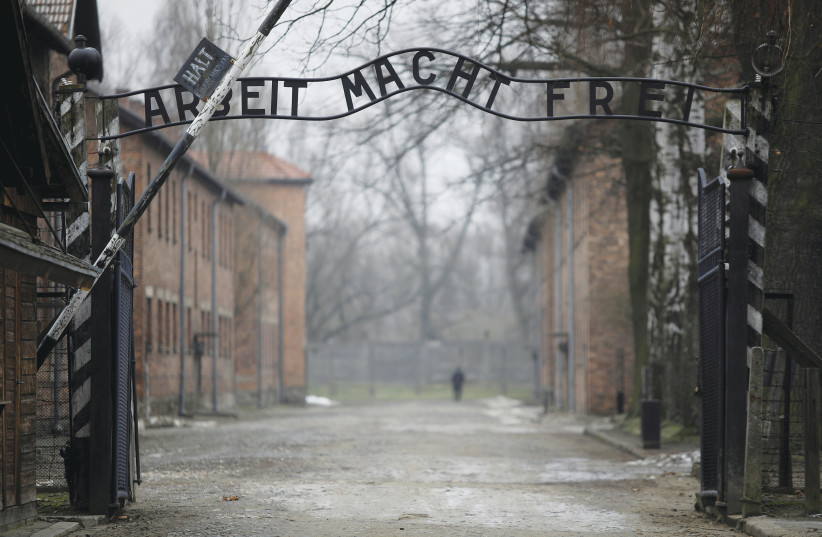Even before page one, I found a lot to dislike about this work of Holocaust fiction. But fortunately, I kept reading. Because despite its faults, A Woman of Valor is a significant and worthwhile book.
My gripes began with what I felt were an unappealing title and cover, compounded by my ambivalence about the genre. While I appreciate that spinning Shoah tales allows deeper exploration of individuals’ motives, feelings and reactions, I fear that Holocaust fiction could fuel Holocaust denial.
Getting past those preliminaries, this monumental family saga is dense with details but skimpy on dialogue. The narrative is written in the style of a storyteller rather than a novelist. Its ponderously long paragraphs are marred occasionally by typos and untranslated phrases in foreign languages.
I had to keep referring to the family trees in the appendix because it’s difficult to keep straight the names and relationships of the dozens of aunts, uncles and cousins populating this 80-year-long story of the Lefkovitzes of Bialystok.

The 80-year-long story of the Lefkovitzes of Bialystok
Fred Skolnik, author of six previous novels (which I have not read), was editor-in-chief of the 22-volume, award-winning second edition of the Encyclopaedia Judaica. Perhaps that explains this long book’s rather encyclopedic style and content, including (maybe too) much information about every character’s sex life.
And yet, A Woman of Valor grew on me, and I could barely put it down.
Its characters grew on me. Especially Emma, the person to whom the title refers. As a teenager in the 1930s, she’s the one family member who fully grasps the danger of remaining in Poland and the urgency to immigrate to Palestine.
Would Emma survive? Would any Lefkovitz family member be spared the coming horrors?
AS I READ on, I realized that Skolnik wasn’t haphazardly throwing personalities on the pages. He was positioning the reader to peer into the windows of one large, messy, eminently ordinary family to better appreciate the enormous tragedy that would ravage Polish Jewry.
He says as much in the afterword, where he describes the thought process in conjuring his characters.
“What I did know was that their lives would be ordinary, their lives would be like ours, with all its joys and sorrows, for I would not think to exalt or sentimentalize Jewish life. That was not the tragedy of the Holocaust. The tragedy was not that something great was destroyed but that something ordinary was destroyed, the lives of people like ourselves.”
Which isn’t to say that ordinary people cannot be heroic. Emma – based on a Krakow fighter named Gusta Draenger – stands out in that regard on a grander scale, but there are scenes of quiet heroism as well. Skolnik describes the Lefkovitz family’s tension as the enemy begins targeting the Jews of Bialystok:
“They sat there for hours, talking in whispers, seemingly calm. The terror was inside them, just beneath their skin, making it crawl whenever they heard a sound nearby. But the shooting seemed very far away now and then it stopped for a while. It was almost seven when Yeisef got up and said to everyone. “Minchah. I’ll get the sidders.”
“What?” Shaul said.
“He needs a minyan,” Boruch said.
“Is he crazy?”
“Wait, I’ll go,” Yoel said.
“On my bookcase,” Yeisef said. “Bring the yarmulkes too.”
The years fly across the pages in an almost dizzying succession of births, marriages and deaths against the backdrop of heartbreak and success on individual and national levels. At regular intervals, Skolnik slows down to provide poignant observations and snapshots.
Here’s a breathless passage written from the perspective of the doomed inside a gas chamber (which incidentally illustrates the value of Holocaust fiction):
“Kaila began to cry very loudly and she could no longer help Malka and the other children who were all crying or screaming too because like them she was gasping and choking and fighting for air that was not there and then she died in a terrible agony of asphyxiation and her body was pulled out of the chamber still intertwined with Malka’s whose face had turned red with the effort to breathe as though the capillaries had burst beneath her skin and no one bothered to separate them when they were dumped on the trolley by the men in striped pajamas because they were light enough to be lifted up like a bale of hay and tossed into the roaring fire where all that they had ever been and all that they might ever be became an acrid stench rising through a chimney and dissolving in the cloudless summer sky.”
It’s tempting to compare A Woman of Valor with Exodus, as both convey a sweeping story centered around the Holocaust and the Israel that grew out of its ashes. But they’re two different animals. Leon Uris was a master novelist, while Skolnik is a master storyteller who has accomplished one of his character’s stated goals: “tell[ing] the story of a nation in the time when it was transformed from one thing into another, the story of ordinary people living ordinary lives in the shadow of History.”
A WOMAN OF VALOR
By Fred Skolnik
Addison & Highsmith Publishers
688 pages, $34.99
